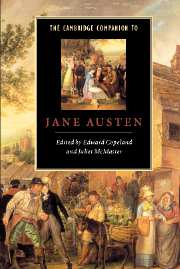Book contents
- Frontmatter
- 1 Chronology of Jane Austen's life
- 2 The professional woman writer
- 3 Northanger Abbey, Sense and Sensibility, Pride and Prejudice
- 4 Mansfield Park, Emma, Persuasion
- 5 The short fiction
- 6 The letters
- 7 Class
- 8 Money
- 9 Religion and politics
- 10 Style
- 11 Jane Austen and literary traditions
- 12 Austen cults and cultures
- 13 Further reading
- Index
3 - Northanger Abbey, Sense and Sensibility, Pride and Prejudice
Published online by Cambridge University Press: 28 May 2006
- Frontmatter
- 1 Chronology of Jane Austen's life
- 2 The professional woman writer
- 3 Northanger Abbey, Sense and Sensibility, Pride and Prejudice
- 4 Mansfield Park, Emma, Persuasion
- 5 The short fiction
- 6 The letters
- 7 Class
- 8 Money
- 9 Religion and politics
- 10 Style
- 11 Jane Austen and literary traditions
- 12 Austen cults and cultures
- 13 Further reading
- Index
Summary
'For what do we live', Mr. Bennet exclaims to his favourite daughter late in Pride and Prejudice, 'but to make sport for our neighbours, and laugh at them in our turn?' (PP 364). The question is rhetorical - an answer, not a proper question - and Jane Austen's moral critics have sternly remonstrated with those who read it as the novelist's own answer. They explain it away as an epigram, only Mr. Bennet's philosophy, to be read ironically - by which they mean dismissively. And indeed Mr. Bennet is particularly obtuse, his wit ill-advised, when he says what he does while chuckling over the letter in which Mr. Collins reports that his patroness, Lady Catherine de Bourgh, disapproves of a marriage between Elizabeth and Darcy. Earlier in the novel, when her father read a letter from the same unctuous writer, Elizabeth was his pleased collaborator, asking, 'Can he be a sensible man, sir?', so Mr. Bennet could complacently reply, 'No, my dear; I think not. I have great hopes of finding him quite the reverse. There is a mixture of servility and self-importance in his letter, which promises well. I am impatient to see him' (64).
- Type
- Chapter
- Information
- The Cambridge Companion to Jane Austen , pp. 32 - 57Publisher: Cambridge University PressPrint publication year: 1997
- 2
- Cited by

